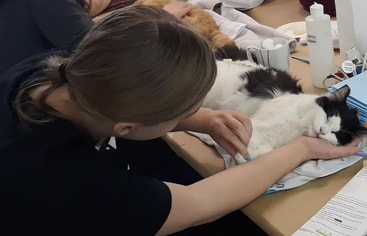 Many pet parents know the importance of spaying or neutering pets, and frequently assume pets at the shelter level are being spayed or neutered. But have you wondered why? At Pawsitive Alliance, we not only help “less desirable” pets get adopted with the Why Not Me? pets program, but we also run an essential spay/neuter program in our home state of Washington. Spay/Neutering Benefits A quick recap: Spaying is the surgical removal of the ovaries and uterus in a female animal, while neutering refers to the surgical removal of the testicles in males. The surgery is typically painless and uncomplicated; pets are under anesthesia and it’s the most common surgery performed by vets. · Your pet will live a longer, healthier life. Spaying helps prevent uterine infections and breast cancer, which is fatal in about 50 percent of dogs and 90 percent of cats. Spaying your pet before her first heat offers the best protection from these diseases. For males, besides preventing unwanted litters that can end up in kill shelters, neutering your male companion prevents testicular cancer, if done before six months of age. For both, there are studies that link even skin cancer to intact pets. · Your spayed female won’t go into heat and your male dog will want to stay home. While cycles can vary, female felines usually go into heat four to five days every three weeks during breeding season. In an effort to advertise for mates, they’ll yowl and urinate more frequently—sometimes all over the house! Unneutered cats and dogs may mark their territory by spraying strong-smelling urine all over as well. Think that’s bad? Well, an intact male will do just about anything to find a mate which includes digging his way under the fence or darting out the door. Once he’s free to roam, he can be hit by a car or risks getting into fights with other males. Neutered cats and dogs focus their attention on their human families. Also, many aggression problems can be avoided by early neutering. · But won’t my neutered male feel less “manly”? Your pet has no concept of sexual identity and ego. His biology and behavior developed in the wild to produce as many offspring as possible so his species could survive. In our modern world, this many offspring only add to the sum total of unwanted pets that end up homeless. · Spaying or neutering will NOT make your pet gain weight. Weight gain is from lack of exercise and overfeeding—not neutering. Your pet will remain fit and trim as long as you continue to provide exercise and monitor food intake. · My pet is purebred. Shouldn’t I breed at least once? Many purebred pets end up in shelters just like mixed breeds. The Humane Society of the United States estimates as many as 25% of shelter dogs are purebred. Plus, did you know that breeding in almost all cases requires a special permit? It is also costly, time consuming and does not create a clone of your pet. Responsible breeders would discourage this thought immediately. · It is cost-effective to spay/neuter. The cost of spay/neuter surgery is a lot less than the cost of having and caring for a litter. It also beats the cost of treatment when your unneutered tom escapes and gets into fights with the neighborhood stray! Additionally, there are many local resources available to people who need help financially for spay/neuter surgeries. · It is good for the community. Stray animals pose a real problem in many parts of the country. They can prey on wildlife which upsets the ecosystem, cause car accidents, frighten children and attack other pets. Spaying and neutering is the best way to reduce the number of animals on the streets. · Spaying and neutering helps fight pet overpopulation. Every year, millions of cats and dogs of all ages and breeds are euthanized or suffer as strays, or litters that have been surrendered. These high numbers are the result of unplanned kittens and puppies that could have been prevented by spaying or neutering. Many of us can be affected by pets that are not spayed or neutered, but caring about homeless pets truly means caring about your community. Millions of tax dollars are spent annually to round up abandoned and unwanted pets, and when homes cannot be found, more dollars are spent on destroying these animals, which also takes an emotional toll. “It is only when all of us assume the responsibility for the homeless pet population that we will see any decrease in the problem,” explains Executive Director of Pawsitive Alliance, Amy Ferguson. “While shelters do their best to place animals in loving homes, many healthy and adoptable animals in our community are still vulnerable due to overpopulation. It’s up to the community to be responsible pet owners and spay/neuter their pets.” If you’re interested in finding out how to spay or neuter your pet but are unable to afford it, and live in the Washington (state) area, check-out our free and low cost spay/neuter programs. For other areas, visit the Humane Society’s page detailing options for financial help. After spaying or neutering your best furry friend, your next step in happy, healthy pet parenthood is pet insurance! By enrolling as soon as you can, dogs and cats can be covered through many of life’s (mis)adventures. You can start protecting your pet today by getting a free quote through Healthy Paws Pet Insurance.
21 Comments
 You’d think that many pets would find their forever homes as puppies or kittens and live a nice, long life with their owner. Unfortunately, that’s not always the case. Older family pets are sometimes surrendered when there’s a major life change in the family, such as a new baby being born, a divorce, the loss of a job or income, or a big move across the country. They also are taken to shelters if their pet parents have passed away, or if they develop a costly medical condition. Once these older pets find themselves at a shelter, they are often overlooked as adopters fall in love with the younger animals. “Senior dogs, especially those with medical problems or disabilities, face a much greater chance of euthanasia at shelters than younger dogs because it is difficult to find adopters for them due to their shorter additional life expectancy and unknown veterinary costs,” states the Old Friends Senior Dog Sanctuary website. The Frosted Face Facts If you’re on the fence about adopting a senior pet, perhaps these factors could sway you:
If you’re considering adopting a senior pet, check out our #WhyNotMePets campaign, or peek AdoptAPet.com and your local shelter, asking about rescuing an older pet. And if you’re not in the position to adopt but still want to help, consider donating funds, goods, or your very valuable time to a senior rescue facility or sanctuary near you. Have a sweet gray muzzle you want to show off? Share a picture of your senior pet with us on Instagram by tagging #pawsitivealliance and #gohealthypaws. And if you aren’t already a pet parent with Healthy Paws, look into getting a free quote to help safeguard not just your special fur friend, but your wallet too. Content provided by Healthy Paws Pet Insurance. Policies are underwritten and issued by ACE American Insurance Company, Indemnity Insurance Company of North America, ACE Property & Casualty Insurance Company, Atlantic Employers Insurance Company, Westchester Fire Insurance Company, and members of the Chubb Group. |
THANK YOU TO OUR AMAZING ORGANIZATION SPONSORS
Pawsitive Alliance is a 501(c)(3) nonprofit organization that increases cat and dog adoptions, spay & neuter, and pet retention efforts across Washington State because we believe they all deserve a chance at a healthy and happy life.
|
Copyright © 2020 All Rights Reserved. Pawsitive Alliance
|

 RSS Feed
RSS Feed










